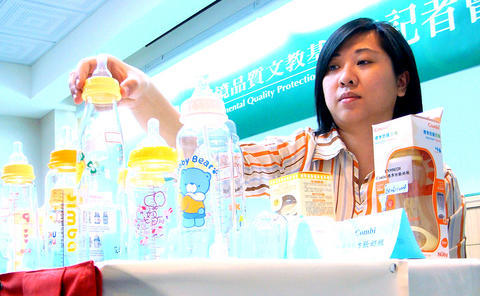Three out of 19 baby bottles sampled by the Environmental Quality Protection Foundation leached traces of the chemical compound bisphenol A (BPA) at a rate above 30ppb, the EU limit.
BPA is a chemical compound that is one of the materials used to make polycarbonate plastic, including that used to make some baby bottles.
The foundation sampled bottles bought in baby goods and warehouse stores in August and last September.

PHOTO: CNA
The foundation said BPA is a chemical that mimics the human sex hormone estrogen and can cause a harmful disruption to the body's hormonal balance, resulting in the increased possibility of miscarriage, obesity, diabetes and even cancer of the breast or prostate.
Foundation chairman Liou Ming-lone (
Liou said the results of the tests will be submitted to the Department of Health, in the hope that it can be persuaded to start setting a limit on how much BPA polycarbonates used in baby bottles can leak.
The foundation opted not to release the names of the three brands that did not pass the test. Instead, they have listed the names of the 16 brands who did conform to EU standards on their Web site.
Ling Young-chien (凌永健), a chemistry professor at National Tsing Hua University, said parents should take precautions to ensure their child is not exposed to too much BPA through polycarbonates.
"There are bound to be traces of BPA particles which were not properly combined with the other chemical components," Ling said, "And as time goes on and the walls of the polycarbonate bottle becomes scratched, the possibility of leaching becomes greater."
Parents should not heat baby food in polycarbonate containers, Ling said. They should also refrain from using hot water or harsh detergents when washing dishes.
"Where possible, parents might want to consider not using polycarbonate plastics at all," he said.

The first global hotel Keys Selection by the Michelin Guide includes four hotels in Taiwan, Michelin announced yesterday. All four received the “Michelin One Key,” indicating guests are to experience a “very special stay” at any of the locations as the establishments are “a true gem with personality. Service always goes the extra mile, and the hotel provides much more than others in its price range.” Of the four hotels, three are located in Taipei and one in Taichung. In Taipei, the One Key accolades were awarded to the Capella Taipei, Kimpton Da An Taipei and Mandarin Oriental Taipei. Capella Taipei was described by

EVA Airways today confirmed the death of a flight attendant on Saturday upon their return to Taiwan and said an internal investigation has been launched, as criticism mounted over a social media post accusing the airline of failing to offer sufficient employee protections. According to the post, the flight attendant complained of feeling sick on board a flight, but was unable to take sick leave or access medical care. The crew member allegedly did not receive assistance from the chief purser, who failed to heed their requests for medical attention or call an ambulance once the flight landed, the post said. As sick

The Taichung District Court yesterday confirmed its final ruling that the marriage between teenage heir Lai (賴) and a man surnamed Hsia (夏) was legally invalid, preventing Hsia from inheriting Lai’s NT$500 million (US$16.37 million) estate. The court confirmed that Hsia chose not to appeal the civil judgement after the court handed down its ruling in June, making the decision final. In the June ruling, the court said that Lai, 18, and Hsia, 26, showed “no mutual admiration before the marriage” and that their interactions were “distant and unfamiliar.” The judge concluded that the couple lacked the “true intention of

INDUSTRY: Beijing’s latest export measures go beyond targeting the US and would likely affect any country that uses Chinese rare earths or related tech, an academic said Taiwanese industries could face significant disruption from China’s newly tightened export controls on rare earth elements, as much of Taiwan’s supply indirectly depends on Chinese materials processed in Japan, a local expert said yesterday. Kristy Hsu (徐遵慈), director of the Taiwan ASEAN Studies Center at the Chung-Hua Institution for Economic Research, said that China’s latest export measures go far beyond targeting the US and would likely affect any country that uses Chinese rare earths or related technologies. With Japan and Southeast Asian countries among those expected to be hit, Taiwan could feel the impact through its reliance on Japanese-made semi-finished products and